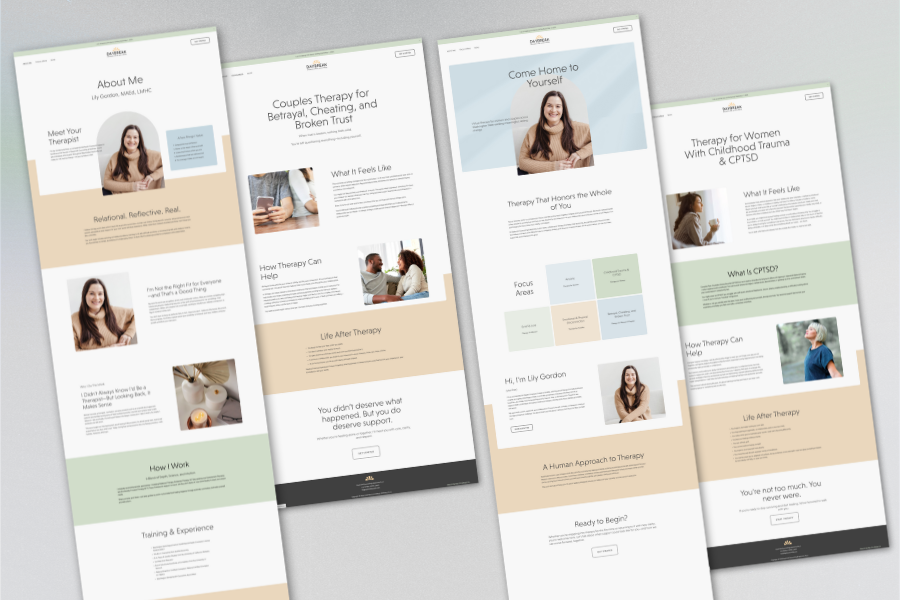Can You Spot the Sloppy Copy on These Therapists' Websites?
When was the last time you searched for your own therapist? Did their websites and Psychology Today profiles make you cringe? Was it more difficult than it should have been?
As a therapist, you have to take that extra step to create high quality, client-attracting copy on your website. Bad copy will turn potential clients away, or attract the clients you aren’t a good fit for. Or worse, sloppy copy can compromise your credibility and make you sound like you’ve got your head in the clouds.
So this week, I’m highlighting 10 examples where copywriting went oh-so-very wrong. Because let’s face it, sometimes the best way to grow is to learn what not to do.
1
What Happens in Vagueness…
Here are three examples of vague copy taken from three different websites. As you read these, notice how quickly you lose interest. I was thinking about what I was going to make for dinner before I even got to the second example!
“This sense of longing to process, understand, and thrive in life means you’re ready for that next step. To me, that next step is collaborative therapy. It’s in collaboration with your story that I contribute honesty, directness, and a safe space to chat about the complicated parts of your life.”
“Through this process we strive to gain greater awareness of how both conscious and unconscious processes play out in your emotional, intellectual and relational life.”
“I would like to work with you to provide a safe and non-judgmental space, where you can explore and process your concerns and develop insights that will facilitate healing and change. I would also like to help you develop effective patterns of behavior and resolve undesirable emotions and interpersonal conflicts.”
These examples use jargon, buzzwords, and vague language. I could have posted at least a dozen more. This is by far the most frequent offender on therapist websites.
Did you notice that reading these three examples became tiresome? Did you want to scan them instead? That’s a sure-fire sign that you’ve written something vague.
The problem is that these are not words any human would say spontaneously. The therapists make no direct link between the words and how they will help a potential client with their specific problem.
Think about the first message you want to send to a person who is looking for a therapist. Get into their shoes and speak directly to them.
Your copy should resonate and be understood by real people - ordinary people who get up every day and trod through life doing ordinary things and wishing they didn’t feel bad all the time. They don’t think about their friends and family as their “relational life,” and they don’t know how “unconscious processes” are connected to their problems. It’s your job to help them make those connections once they are in therapy, but you can’t expect them to have this awareness before therapy.
2
Mystical, Woo-Woo, Abstract Language
“When heart, body, mind + soul combine, the awakening is majestic; and when trust in that experience is broken, the pain is tragic.”
What the what? A heart, body, mind, soul awakening sounds a bit scary, to be honest. These are strong words with little meaning.
If your work is a little woo-woo, spiritual, or utilizes unconventional approaches, you still need to use language that people can understand and apply to their lives.
3
Ignoring Your Clients’ Needs
When I was shopping for a new car, the salesman asked me what I was looking for. I told him I wanted a fuel-efficient hatchback with good resale value, a back-up camera, and Bluetooth connectivity. Imagine my surprise when the first thing he did was open the hood and start explaining the engine technology. Needless to say, that guy did not sell me a car that day. I requested a different salesman who listened to my needs and sold me a new Honda Fit that day.
Listing your approaches with no explanation as to what they are or how they will help your client is just like the oblivious salesman; you’re missing the mark. You’re a therapist; you don’t lack perspective-taking skills. So stop looking so out of touch.
And to those of you who do this to build credibility: this will surely backfire as well. A list of your credentials effectively creates distance between you and your potential client by flaunting your training but neglecting to show that you are good at listening and understanding.
4
Stating the Obvious
“I view psychotherapy as a collaborative process in which we work together to make sense of the problems that have brought you in, and work towards mutually established goals.”
Duh. What else would we do?
5
I Have No Idea What That Means
“My practice is broadly focused on the task of embodiment and exploring the joys and challenges of having a human body. Often, this means working at the intersections of gender, sexual orientation, race, ethnicity, disability and chronic illness, belief systems, and other aspects of our identities. This process often involves examining the effects of past trauma, exploring our immediate social environments, and addressing the impact of cultural and political climates on our day-to-day experiences and worldview. ”
Most people who come to therapy don’t know why they are struggling in life; they just know that they are depressed, anxious, or fighting with their spouse. They want their lives to be different, and they want you to help them. The copy above formulates a psychological hypothesis that, according to the therapists, explains the client’s problems.
This isn’t entirely problematic when the hypothesis can be understood clearly by most people. In this case, her website visitors may not connect that the lack of “embodiment” and intersectionality is related to their problems because they don’t know what these terms mean. Few people consciously realize the way they are marginalized and oppressed or how it influences how they act in the world.
In addition to these concepts being misunderstood, they are not terms a potential client would put into a search engine when looking for a therapist, so this will negatively affect Google rankings as well.
6
Jack of All Trades, Master of None
“My counseling practice focuses on serving children, adults, and couples or families. In working with children, I am certified in Cognitive Behavioral Therapy-Trauma Focused for children. I also work with adults in issues of anxiety, depression, and other mental health issues. In my practice I provide counseling, therapy, psychodynamic psychotherapy, and psychoanalysis. My treatment approach allows for the effective engagement of a wide range of conditions, including but not limited to personality issues, depression, bi-polar, psychotic states, autistic spectrum, and trauma (PTSD).”
Now read this:
“My counseling practice focuses on serving Gifted individuals. Were you that kid who graduated MIT at 15, and are feeling like a misfit because of it? Being smart is a blessing but can also feel very isolating. I am trained in giftedness and understand the unique needs and experiences of the gifted. I will provide a place where you can fully be yourself - so that your creativity and productivity can flourish.”
Which therapist are you likely to remember?
In the first example, the therapist tells you that she works with everyone and treats every condition under the sun. So if you have an eating disorder, try her out! If you are grieving, yep, she can help you. If you have borderline personality disorder, she’s got you covered.
While there’s nothing wrong with being a generalist, doing everything for everyone makes you forgettable.
7
On Another Planet
“WELCOME! We both hope and wish that the wonderful qualities of the innate field of awareness can be experienced directly and immediately in your home…And why not? The same center is within you and within us. In the Argentinean author Jorge Luis Borges’ short story, “The Aleph”, a man discovers that the center of the universe is located in his own basement. This center point gives its beholder access to the oneness of the field. The Aleph point is the center, and all the centers are completely interconnected at the subtle level of the field of consciousness. Thus meetings can be direct, unmediated and consequently, inside to inside…self to self.”
I hope I don’t need to explain why this copy just doesn’t work.
8
Bad Spelling and Grammar
“My extensive training in trauma assits in making the appropiate formulations particularly for sentencing reports for the offender population. My training in psychiatry at Harvard, has equipped me with the expertese needed to provide appropiate diagnoses and treatment. My lengthy career with the offender population has given me a unique understanding of this population.”
Did they forget to teach you spelling and grammar at Harvard?
This person managed to squeeze six grammar and spelling mistakes in this one short paragraph. Can you imagine reading an entire website written by this person?
9
Copy That Says Nothing
“Welcome to my practice. I am Dr. _____________, a licensed psychologist and member of the American Psychological Association in practice for over 30 years. I provide individual counseling and therapy for adults having current emotional or adjustment difficulties.”
“Our #1 concern is your well-being. Our treatments are innovative, evidence-based, and personalized. We zero in on what will best help you, individually. Whatever the need or the challenge, we’re here to help you on your journey.”
In both examples, the paragraph basically says nothing. What a waste of valuable website space.
10
The Neglected Website
“Fall has arrived! Don’t fall with the Autumn leaves – Start practicing self-care today!”
But wait, autumn was eight months ago.
Oooooooh, this therapist doesn’t take the time to update her website.
She must be very unorganized. Or maybe she doesn’t care.
You see where I’m going here. An outdated website leaves a bad impression. Your service is questionable, and your credibility will take a nose-dive. It might even look like you’re out of business.
Also, if you aren’t updating your website, your Google rankings probably suck too.
So, the next time you read copy that just doesn’t measure up, take it as an opportunity to look for what you can learn from it.




































